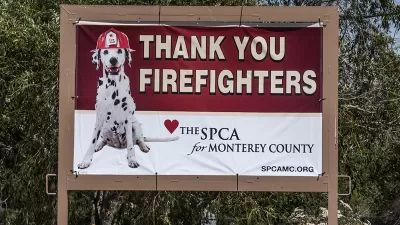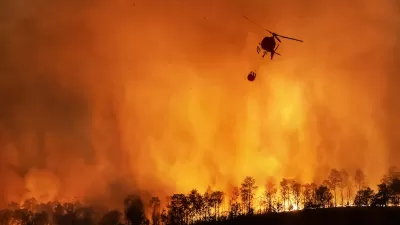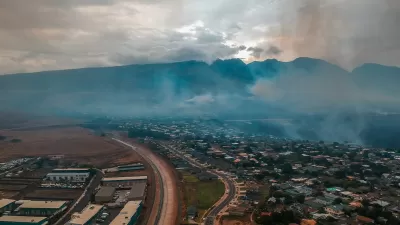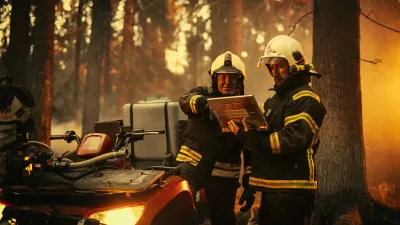As wildfires become bigger, more frequent, and more expensive to fight, new methods for preventing the worst impacts of fire will be necessary, according to a new study.

Bob Berwyn shares news of a new study published in the Proceedings of the National Academy of Sciences that suggests new methods for fighting and preventing wildfires will be necessary in a future defined by climate change.
Based on research in Colorado and California, "the Forest Service and other agencies simply won’t be able to keep up with bigger and longer-lasting fires unless they adopt a new, forward-looking attitude and different strategies to prepare for wildfires in the era of global warming," explains Berwyn.
Specifically, "instead of trying to fight every fire or thin vast areas in futile prevention efforts, the Forest Service should focus on protecting communities and limiting new development in fire-prone areas, while letting some fires — even large — burn, which will help Western landscapes adapt to climate change in the decades ahead."
Berwyn provides more detail on the study, by researchers at the Institute for Alpine and Arctic Research at the University of Colorado-Boulder, while referencing examples of unsustainable practices currently used to battle and prevent wildfires.
The findings connecting land use regulations to wildfire prevention, by restricting development and sprawl, echo a 2016 report from the Open Spaces Initiative at the University of Wyoming.
FULL STORY: The Future of Fighting Wildfires in the Era of Climate Change

Alabama: Trump Terminates Settlements for Black Communities Harmed By Raw Sewage
Trump deemed the landmark civil rights agreement “illegal DEI and environmental justice policy.”

Planetizen Federal Action Tracker
A weekly monitor of how Trump’s orders and actions are impacting planners and planning in America.

The 120 Year Old Tiny Home Villages That Sheltered San Francisco’s Earthquake Refugees
More than a century ago, San Francisco mobilized to house thousands of residents displaced by the 1906 earthquake. Could their strategy offer a model for the present?

In Both Crashes and Crime, Public Transportation is Far Safer than Driving
Contrary to popular assumptions, public transportation has far lower crash and crime rates than automobile travel. For safer communities, improve and encourage transit travel.

Report: Zoning Reforms Should Complement Nashville’s Ambitious Transit Plan
Without reform, restrictive zoning codes will limit the impact of the city’s planned transit expansion and could exclude some of the residents who depend on transit the most.

Judge Orders Release of Frozen IRA, IIJA Funding
The decision is a victory for environmental groups who charged that freezing funds for critical infrastructure and disaster response programs caused “real and irreparable harm” to communities.
Urban Design for Planners 1: Software Tools
This six-course series explores essential urban design concepts using open source software and equips planners with the tools they need to participate fully in the urban design process.
Planning for Universal Design
Learn the tools for implementing Universal Design in planning regulations.
Clanton & Associates, Inc.
Jessamine County Fiscal Court
Institute for Housing and Urban Development Studies (IHS)
City of Grandview
Harvard GSD Executive Education
Toledo-Lucas County Plan Commissions
Salt Lake City
NYU Wagner Graduate School of Public Service





























